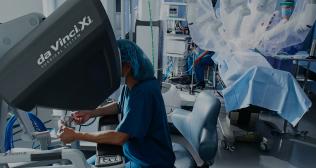
Bariatric Surgery in Mumbai
Bariatric surgery, or weight loss surgery, is a surgical procedure used to help people with severe obesity lose weight, reduce potential life-threatening weight-related health risks, and live longer. Evidence suggests that bariatric surgery, also referred to as metabolic surgery, coupled with healthy diet and lifestyle changes, can help lower death rates in severely obese patients.
Committing to a lifelong healthy lifestyle through good nutrition and exercise before and after the surgery can help you lose more weight and achieve long-term weight loss.
Best Bariatric Surgery Hospital in India – Fortis Hospital, Mulund
If you’re considering bariatric surgery to lose those unhealthy fats and optimise your overall health, Fortis Hospital, Mulund, renowned for its world-class facilities, cutting-edge technology, and highly skilled doctors, may be the right choice. Our centre offers a wide range of advanced surgical and non-surgical treatments for obesity and metabolic disorders, delivering exceptional outcomes. Our dedicated multidisciplinary team, led by Dr. Hrishikesh Salgaonkar, a highly experienced and top bariatric surgeon, works together to create a personalised plan that promotes long-term weight loss.
Read on to learn more about bariatric surgery why you need it, if it’s always working or right for you, the benefits, risks, and side effects of the procedure, etc.
What is bariatric surgery and how does it work?
Bariatric surgery comprises a range of surgical procedures to aid weight loss, particularly in severely obese individuals, when other methods like healthy eating and lifestyle modifications haven’t worked, posing serious health concerns. While the main goal of bariatric surgeries is to treat obesity, these procedures can be effective in preventing or managing obesity-related metabolic conditions such as diabetes, fatty liver disease, sleep apnoea, high blood pressure and cholesterol.
These procedures work by altering the structure of your digestive system usually your stomach and intestines limiting the amount of food you can eat or your body’s ability to take in fat and calories. These changes affect your hormones in the gastrointestinal tract in many ways that may curb appetite and hunger, potentially aiding in weight loss.
What are the types of bariatric surgery?
There are different types of bariatric surgery, each offering distinct advantages and disadvantages. The types of bariatric and metabolic surgeries we offer at Fortis Hospital, Mulund, include:
• Sleeve gastrectomy (gastric sleeve): This procedure involves removing a large portion of your stomach, about 75–85%. This naturally restricts the amount of food intake and curbs appetite by reducing hunger hormones, helping you achieve significant weight loss.
• Roux-en-Y gastric bypass (standard gastric bypass): For this procedure, the surgeon creates a small stomach pouch and bypasses part of your small intestine. It limits calorie absorption and affects gut hormones that reduce hunger.
• One-anastomosis gastric bypass (OAGB): Also known as mini gastric bypass, it is done like RYGB but simpler, with one intestinal connection. This technique restricts both hunger and calorie absorption.
• Single anastomosis duodenal-ileal bypass with sleeve (SADI-): This procedure is effective for severely obese patients (BMI > 60) and is often performed in two stages. It cuts your stomach’s size and alters the digestive pathway, limiting food intake and calorie absorption.
• Biliopancreatic diversion (BPD): This procedure combines a smaller stomach with a large bypass for significant weight loss.
• Revisional bariatric surgery: This procedure is for patients with prior failed or complicated surgeries. It includes gastric band removals or corrections of earlier surgeries
Your surgeon will recommend a procedure that best suits your specific needs.
Why do you need bariatric surgery?
You may be recommended bariatric surgery if you suffer from severe obesity and have not been able to lose excess weight or sustain weight loss through conventional means such as diet, exercise, or medications.
Doctors divide obesity into three classes based on body mass index (BMI):
• Class I obesity: BMI 30 to less than 35 kg/m2
• Class II obesity: BMI 35 to less than 40 kg/m2
• Class III obesity: BMI 40 kg/m2 and above
Obesity isn’t just a cosmetic concern, it poses several health risks, including diabetes, heart disease, high blood pressure, high cholesterol, sleep apnea, liver disease, kidney disease, and certain cancers. Bariatric surgery can be lifesaving, particularly for people with severe obesity, which often does not respond to lifestyle changes.
Is bariatric surgery right for you?
At Fortis Hospital, Mulund, our team of obesity specialists will evaluate your overall health, including some medical tests, to determine whether you are an ideal candidate for bariatric surgery.
In general, a patient must meet the following criteria to be eligible for bariatric surgery:
• A BMI greater than 37.5 kg/m², which indicates severe or morbid obesity (without comorbidities)
• A BMI greater than 32.5 kg/m² (with co-morbidities_
• A BMI greater than 30 kg/m² (with life-threatening disorders)
• Obesity cannot be treated with diet and exercise alone
• Aged 18 to 65, but some exceptions can be made depending on a person’s condition
Bariatric surgery is not suitable for people with certain conditions. These include:
• Active substance abuse
• Uncontrolled psychological issues
• Pregnancy
• High-risk medical conditions
How is bariatric surgery performed?
Before undergoing bariatric surgery, our team of specialists at Fortis Hospital, Mulund, will discuss the potential benefits and risks with you. You will have a detailed pre-operative evaluation, including blood work, ECG, Echo, PFT, sleep studies, X-ray, and endoscopy, to make sure you are physically and mentally fit for the surgery. You’ll also have to follow a specific diet and other guidelines, including restrictions on alcohol and tobacco use.
Your care team will also provide proper guidance on procedure details, recovery time, and post-operative care.
Bariatric surgeries are usually performed through minimally invasive methods – laparoscopy and robotic surgery. This means better patient outcomes – smaller incisions, less pain, shorter hospital stays, and faster recovery times. In rare cases, some patients may need open surgery due to their specific conditions.
What are the benefits and risks of bariatric surgery?
Bariatric surgery, like any major surgical procedure, comes with both benefits and risks. Bariatric surgery can help obese people lose weight and extend their lifespan.
It also reduces the risk of many conditions linked to obesity, including:
• Type 2 diabetes
• Heart disease
• Stroke
• High blood pressure
• Unhealthy cholesterol levels
• Sleep apnoea
• Nonalcoholic fatty liver disease
• Osteoarthritis
Common post-op risks and side effects of bariatric surgery include:
• Infections
• Bleeding
• Blood clots
• Leaks in the gastrointestinal system
• Nausea and vomiting
• Bowel obstruction
• Gallstones
• Acid reflux
• Hernias
• Dumping syndrome
• Anaemia
• Ulcers
• Low blood sugar
• Death - in rare cases
Does bariatric surgery always work?
Studies suggest that more than 90% of patients lose 50% of their excess body weight and keep it off. However, the success or the amount of weight loss depends on the type of surgery used, your commitment to a healthy lifestyle and other factors.
Takeaway
If you’re struggling with obesity and its related health problems despite using conventional treatments, bariatric surgery is the most effective tool to lose weight, improve quality of life and lifespan. But remember that this lifesaving procedure is just one part of your long journey toward a healthier, fitter lifestyle. Making lasting changes to your diet and getting regular exercise will ensure long-term weight loss maintenance.
Categories
Clear allMeet the doctor

- Gastroenterology and Hepatobiliary Sciences | GI, Minimal Access and Bariatric Surgery | Metabolic & Bariatric Surgery | Robotic Surgery
- General Surgery | General and Laparoscopic Surgery | General and Minimal Access Surgery | Robotic Surgery
-
14 Years
-
1500



















